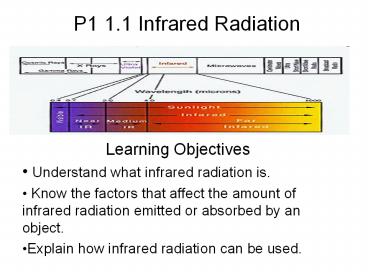P1 1.1 Infrared Radiation - PowerPoint PPT Presentation
Title:
P1 1.1 Infrared Radiation
Description:
P1 1.1 Infrared Radiation Learning Objectives Understand what infrared radiation is. Know the factors that affect the amount of infrared radiation emitted or absorbed ... – PowerPoint PPT presentation
Number of Views:110
Avg rating:3.0/5.0
Title: P1 1.1 Infrared Radiation
1
P1 1.1 Infrared Radiation
Learning Objectives
- Understand what infrared radiation is.
- Know the factors that affect the amount of
infrared radiation emitted or absorbed by an
object. - Explain how infrared radiation can be used.
2
Starter Where and how is heat transfer taking
place at this seaside?
3
- Barbecue grill cooking burgers and sausages
(conduction, radiation). - The car bonnet is so hot that as a sideline to
the barbecue, someone is cooking food on it
(conduction). - Picnic boxes labelled cold and hot contain
items that have been kept cool and warm,
respectively, to prevent heat transfer taking
place. - The twins on the left are wearing identical
clothing except that one is wearing a white
t-shirt and keeping cool, while the other is
wearing a black t-shirt and looking much hotter
(radiation). - The twin in the black t-shirt is trying to keep
himself cool with a portable fan (convection). - The fluttering sails on the boat out at sea and
the fluttering flag on the flagpole show that it
is windy at the seaside (convection). - The ice-creams are melted very quickly by the
heat of the Sun, much to the annoyance of the
child near the ice-cream van (radiation).
4
What does this camera show?
5
Transferring energy
- If two objects are at different temperatures e
will be transferred from the h to the
cooler object, until they are both the - s temperature.
- This can happen in different ways
- Infrared radiation
- Conduction
- Convection
6
Infrared radiation
- Energy can travel through materials or through
a vacuum as IR. IR transfers energy by
waves. Infrared waves are similar to
waves, except that we
cannot see them. - Everything and absorbs IR. The amount
of IR absorbed or emitted by a body depends on
its temperature and the nature of its surface.
Light, Emits, Electromagnetic, Transparent
7
Emitting and absorbing infrared radiation.
- Q) Design a table showing which items of the
school uniform are good and bad in the summer and
the winter, with reasons for this? - A surface will reflect some of the infrared
radiation that reaches it, and absorb the rest. - Light coloured, shiny surfaces are good at
reflecting radiation, so they are poor at
absorbing it. Dark, matt surfaces are good at
absorbing radiation. - Surfaces that are good at absorbing radiation are
also good at emitting it. Dark matt surfaces are
good emitters of radiation, and light shiny
surfaces are poor emitters.
8
- http//www.youtube.com/watch?v2--0q0XlQJ0
9
1. What is the image?
10
2. What is it?
11
3. Its a zebra. But in visible light, what
colour are the stripes that look white in
infrared?
12
4. What is it?
13
5. Why would someone want an infrared image of
their house?
14
6. Why does the lizard look so different in
colour from the hand in this infrared picture?
15
7. Here you can see infrared waves doing
something that all types of wave can do. What?
16
Quick Quiz
- Do all objects emit infrared radiation?
- Cross out the incorrect words The
(hotter/cooler) an object is the (more/ less)
infrared radiation it radiates in a given time. - What kind of surfaces are good emitters of
infrared radiation? - What kind of surfaces are poor emitters of
infrared radiation?
17
Planning an experiment
- Plan a class experiment to
- To measure the temperature of hot water
cooling in shiny and dark cans. - Discuss what the independent, dependent and
controlled variables are. - What is the fair test for this investigation?
- Make a prediction.
- Draw a labelled diagram of your experiment.
- Write a method to explain what you would do.
- What would you expect to happen?
- Design a results table.
18
Copy and complete
- If two objects made from the same material have
identical v_________, a thin, flat object will
radiate heat energy faster than a f____ object.
This is one reason why domestic radiators are
t______ and flat. - Radiators are often painted with w_______ gloss
paint. They would be better at radiating heat if
they were painted with b______ matt paint, but in
fact, despite their name, radiators transfer most
of their heat to a room by c___________.
19
Plenary
- Explain why marathon runners are wrapped in foil
blankets following a race. - Explain why kettles are light coloured.































